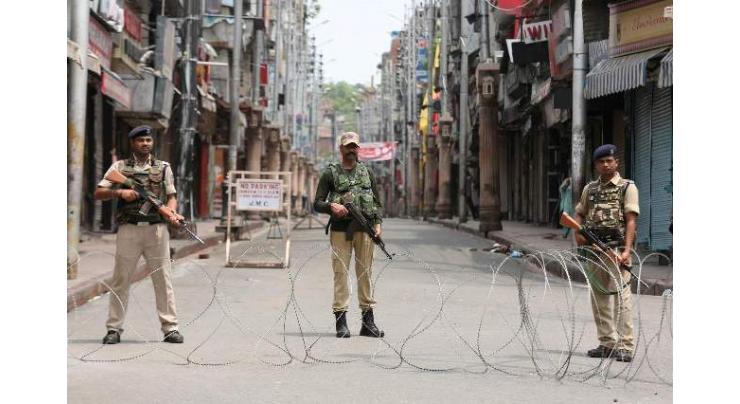
India's Unilateral Action In IIOJK, Root Cause Of Tension: Chinese Professor
Faizan Hashmi Published June 09, 2021 | 10:06 PM

India's unilateral change of the status quo in Indian Illegally Occupied Jammu and Kashmir (IIOJK) on August 5, 2019 was the root cause of tension between India and Pakistan, Cheng Xizhong, visiting professor at Southwest University of Political Science and Law and former Defense Attache in South Asian countries said on Wednesday
BEIJING, (UrduPoint / Pakistan Point News - 9th Jun, 2021 ) :India's unilateral change of the status quo in Indian Illegally Occupied Jammu and Kashmir (IIOJK) on August 5, 2019 was the root cause of tension between India and Pakistan, Cheng Xizhong, visiting professor at Southwest University of Political Science and Law and former Defense Attache in South Asian countries said on Wednesday.
"Tensions between India and Pakistan have been going on for years. As we all know, the root cause of the tension lies in India, which is caused by India's unilateral change of the status quo in Indian Illegally Occupied Jammu and Kashmir (IIOJK) on August 5, 2019," he said in a statement.
He said that the continuous tension between Pakistan and India poses a serious challenge to peace and stability in South Asia.
"At the same time, in the past two years, India has continuously strengthened the deployment of military and intelligence forces in IIOJK and brutally suppressed the Kashmiri people fighting for national self-determination. The Kashmiri people have lost their basic rights of expression, freedom of movement, external contact and even survival," he added.
Cheng observed that over the years, Pakistan, the Muslim world and the entire international community have unanimously and strongly condemned India's heinous human rights violations in IIOJK.
Decades of history have repeatedly proved that the Kashmiri people cannot be conquered by force. Even if they fight to the last person, the Kashmiri people will not give up the struggle for national self-determination.
He said, the Pakistani people, especially the people in Azad Kashmir, have unremittingly provided political, moral and diplomatic support to the Kashmiri people who are fighting for justice on the front line. The Pakistani government has unremittingly exposed India's atrocities in the international arena, thus winning the high attention of the United Nations and the international community to the Kashmir issue.
Recently, both Pakistan and India have expressed willingness to improve their relations, which is a positive development. "However, I feel that if India does not give up its regional hegemonism and territorial expansion policy and does not respect the right of the Kashmiri people to self-determination, even if relations improve, the fundamental problem of peace and stability in South Asia will not be solved," he added.
He said, on June 4, Prime Minister Imran Khan said that Pakistan had always wanted a 'civilized' and 'open' relationship with India. PM Imran Khan further stated that "even if they give us a roadmap, then that is acceptable." "Between the lines, I can see Pakistan's sincerity to improve relations with India, to work with India and other South Asian countries to develop economy and eradicate poverty to maintain regional peace and stability, and the rationality, feasibility and acceptability of PM Imran Khan's latest proposal," he said.
Related Topics
Recent Stories

Mired in crisis, Boeing reports another loss

Session Awarding Ceremony 2024 held at Cadet College Muzaffarabad

Austrian ski great Hirscher to make comeback under Dutch flag

Pakistan, Japan agrees to convene 'Economic Policy Dialogue'

FM Dar conveys deepest sympathy on torrential rains devastation in UAE

Spain PM Sanchez says weighing resignation after wife's graft probe

Tennis: ATP/WTA Madrid Open results - 1st update

Long-lost Klimt portrait auctioned off for 30 mn euros

Osaka seals first win on clay since 2022 in Madrid

Earthquake jolts Karachi

Sindh minister orders operation after attack on police in Ghotki

TikTok to fight US ban law in courts
More Stories From Kashmir
-

AJK observes World Earth Day with a call to action on plastic pollution
2 days ago -

AJK PM Marks One Year in Office, Vows to Continue Serving with Zeal
4 days ago -

Mehbooba Mufti vows to fight India's hostile policy
4 days ago -

Azad Jammu Kashmir Prime Minister Chaudhry Anwar ul Haq Pays visit to special Advisor's residence
4 days ago -

Mirpur Police arrest 68 suspects of food outlet attack
5 days ago -

Modi govt broken all records of oppression to win elections: President AJK
5 days ago
-

AJK business forum proposes measures for industrial growth
6 days ago -

MoU signed for skilled manpower in AJK: PM lauds initiative
6 days ago -

Fresh wave of freedom struggle gains momentum in IIOJK
6 days ago -

JKNF clarifies Muneer Khan's political shift
6 days ago -

AJK gov’t initiates efforts to revive sick industrial units
7 days ago -

Power Cutback at Neelum-Jhelum Dam: Pressure Drop Forces 530 MW Reduction
8 days ago











